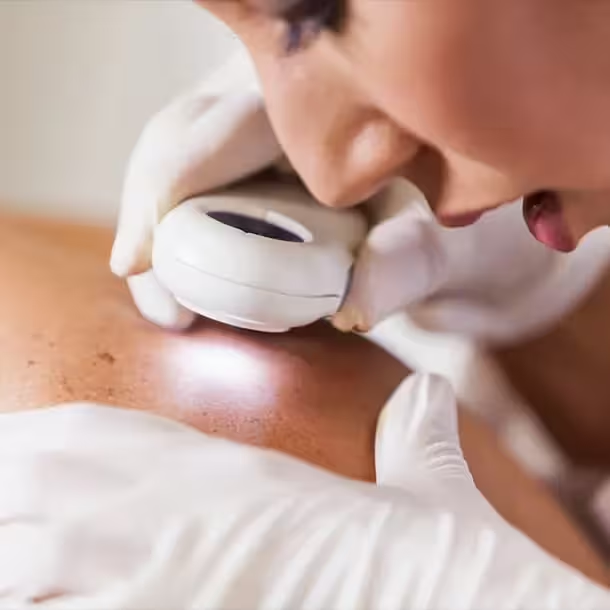Skin Biopsy in Dubai
What Is Skin Biopsy?
A skin biopsy is a simple medical test in which a dermatologist removes a very small sample of skin to be examined under a microscope. It may also be referred to as a skin biopsy test. The purpose of a biopsy is not to treat the skin on the same day, but to gather accurate information that supports the correct diagnosis, especially during skin cancer screening or evaluation of suspicious lesions.
A dermatologist may recommend a skin biopsy when the appearance of a rash, spot, patch, or lesion cannot be fully explained by a visual examination alone. Many skin conditions can appear similar on the surface, and a biopsy helps confirm the exact nature of the condition. This is especially useful when symptoms persist, change over time, or do not respond as expected to initial treatment. In some cases, a biopsy is advised after mole mapping or during ongoing skin cancer screening.
Who Needs Skin Biopsy In Dubai?
- Patients with suspicious moles or lesions identified during skin cancer screening
- Individuals with unexplained rashes or growths
- Anyone needing a definitive diagnosis before treatment planning, including laser skin treatments or cryotherapy treatment


What Are The Benefits?
- Accurate diagnosis of skin conditions
- Helps guide appropriate treatment decisions
- Early detection of malignancy during skin cancer screening
- Safe and precise procedure performed by an experienced dermatologist
Types of Skin Biopsy in Dubai
Dermatologists choose the method based on the size, depth, and location of the area being sampled, as well as the clinical question being answered. The main types of skin biopsy include:
- Punch biopsy: A small circular tool is used to remove a tiny “core” of skin that includes deeper layers. This method is commonly used for rashes, inflammatory conditions, and lesions identified during mole mapping.
- Shave biopsy: A thin surface sample is taken from the top layers of skin. This may be used for raised lesions when deeper sampling is not required, often before treatments such as cryotherapy treatment or laser skin treatments.
- Excisional biopsy: The entire lesion or a larger portion of it is removed. This is generally chosen when full-thickness sampling or complete removal is needed for accurate assessment during skin cancer screening.
How We Perform Skin Biopsy at Modern Aestheticss
- Examine lesion type and location
- Review medical history and risks
- Plan biopsy technique (punch, shave, or excision)
A skin biopsy appointment begins with a dermatologist consultation and detailed skin assessment. The dermatologist examines the area, discusses symptoms and timelines, and confirms whether a biopsy is the best next step. This step is often part of a broader skin cancer screening approach used by the best dermatologist in Dubai to ensure accuracy.
Next, local anesthesia is used to numb the area. This helps keep the skin biopsy procedure comfortable. You may feel a brief sting from the numbing injection, then the area typically becomes numb and pressure-only sensations are expected.
After the area is numb, the sample collection is performed using the method selected (punch, shave, or excisional). The goal is to obtain an adequate sample while keeping the procedure as gentle and precise as possible. If needed, a small stitch or two may be used to close the site, depending on biopsy type and location.
Finally, the dermatologist dresses the biopsy site. You will leave with a small protective dressing and clear instructions on how to care for the area at home.
- Mild swelling, redness, or scab formation
- Keep area clean and follow wound care instructions
- Follow-up for biopsy results and further treatment
Understanding Skin Biopsy Results
Once the sample has been examined, your dermatologist will review the report and discuss what it means in the context of your skin exam and medical history. Skin biopsy results often provide one of three outcomes:
In some cases, the findings confirm a specific diagnosis. In other cases, results may suggest a group of conditions, and the diagnosis is refined by combining the report with your symptoms and examination. Occasionally, results can be descriptive rather than definitive, and your dermatologist may recommend follow-up, additional tests, or monitoring, depending on the overall clinical picture.
Your appointment to discuss results is also a good time to ask practical questions, such as what changes to watch for, whether treatment is needed now, and what the plan is if symptoms change in the future.
Role of Histopathology
Histopathology is the process of examining tissue under a microscope to understand changes at a cellular level. For patients, it can help to think of it as a detailed “microscope review” of the skin sample.
After a biopsy, the sample is sent for histopathology, where it is prepared and examined by specialists trained to interpret skin tissue patterns. This includes tissue processing in histopathology, which refers to the steps that preserve the sample, prepare thin sections, and apply stains that make different structures easier to see. Your dermatologist then uses that information to guide the next steps in a careful and medically appropriate way.
Frequently Asked Question
Most patients find it very manageable. Local anesthesia is used to numb the skin, so you typically feel a brief sting from the anesthetic and then pressure rather than pain.
Healing depends on the biopsy type and the area of the body. Many biopsy sites settle within 1 to 2 weeks, while areas that required stitches or experience more movement may take longer.
Timing varies depending on the laboratory process and whether additional staining is needed. Your clinic will guide you on expected timelines and will schedule a review once the skin biopsy results are available.
Yes, a skin biopsy procedure is commonly performed in dermatology. As with any minor procedure, there can be temporary redness, tenderness, or a small scar, and your dermatologist will discuss individualized considerations before proceeding.
Not always. Some results simply confirm a benign condition or explain a rash that can be managed with skincare or medication. If treatment is needed, your dermatologist will explain options based on your diagnosis and goals.

Why Choose Modern Aestheticss?
- Precision diagnostic techniques
- Safe, dermatologist-led procedure
- Ensures accurate diagnosis and treatment planning






